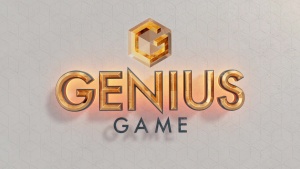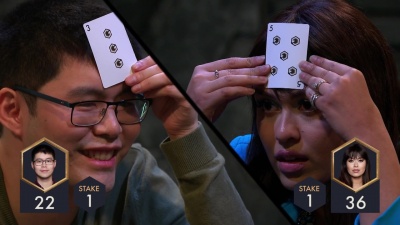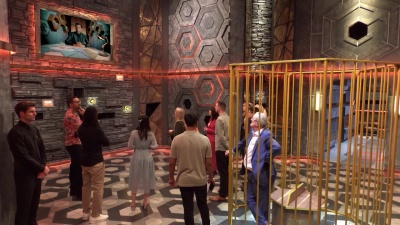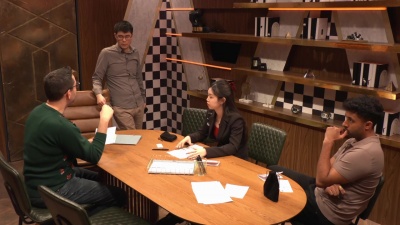Genius Game
Contents |
Host
Broadcast
Remarkable Television for ITV, 30 April to 11 June 2025 (8 episodes in 1 series)
Synopsis
Eleven contestants compete in a series of games that are designed to test their logic and social skills to win a cash prize.
Each episode was divided into two segments: a Main Match and a Death Match. The bulk of the show was occupied by the Main Match, which involved everyone. The usual Main Match was divided into rounds, where points could be scored. For instance, the first episode staged a bank heist, where competitors could rob moneybags, gold, or a crown; but if more tried to rob an item than there were available, all the competitors would go to jail and be out of the next round.
There was also a further social element: competitors could "tip off" against another player, saying they were (say) going to rob the moneybag. If a "tip off" was right, the player wouldn't get their item, and would be in jail for the next round. You can quickly see that this gets very complex, and it's to the credit of Genius Game that the possibilities never became confusing to an attentive viewer.
Whoever won the Main Match was rewarded with Garnets, the currency in the game. They'd also get a Token of Life, ensuring that they wouldn't be in the subsequent Death Match; if there was just one winner of the Main Match, they'd be able to give another Token of Life to one of their allies. Whoever came bottom of the Main Match would be in the Death Match, and would be allowed to pick their opponent.
Death Matches were solo challenges, of observation and memory and bluffing and logic. Loser of the Death Match was eliminated from the contest, and gave their Garnets to the winner. The Korean original show would regularly feature players using Garnets as currency, to bribe and to reward alliances; this simply didn't happen amongst our players.
Genius Game was based on a Korean series that ran in the early 2010s. It didn't attract huge viewing figures, but the people who watched it loved it, and it became something of a touchstone for "clever" television - it tests intellectual and social skills like no other programme on television.
The ITV version was fronted by David Tennant, a famous and familiar face; we can imagine some of his characters playing Genius Game in their fictional worlds. David Tennant was only ever shown on the big screen, delivering soliloquies. He didn't interact with the contestants, that was left to "the Dealers", his representatives on Earth. Genius Game had been sold as a David Tennant show, and he was barely in it. Perhaps it might have been better for the show itself to be the star, for the games to be introduced by a relatively anonymous person - one of the regular Dealers, or someone from the production gallery.
Genius Game did retain other elements of the original's style, with heavily stylised paper cut-out animations and clear captions, and occasional flash-forward and flash-back time travel moments. Hexagons were used as a recurring design motif, another element from the Korean show. Players were encouraged to dress in clothes as smart as their brains.
ITV had originally optioned The Genius format about ten years earlier, and recorded this series almost a year before it was broadcast. Perhaps the long gestation didn't help - viewing habits changed over the intervening decade, streaming became A Big Thing, with a gazillion options of shows to watch. There was an expectation that television would be easy to understand if you're not fully involved, but Genius Game requires full concentration throughout. Fans of The Genius were upset that Genius Game wasn't as good as they remembered the original being.
For linear broadcast, ITV opted to put Genius Game up against Race Across the World on Wednesdays and Taskmaster on Thursdays. First week ratings were really low, with the premiere episode gaining 1.2 million viewers. A day later, the second episode didn't fare any better, scoring 800,000 viewers. Before the second week's shows aired, ITV had dropped the Thursday show and replaced it with repeated celebrity editions of Millionaire. Viewing figures remained depressed.
To use a sporting analogy, Genius Game was a ricochet off the goalpost. The show was beautifully filmed and looked sumptuous. The challenges were expertly designed, but too many challenges were nerfed by players desperate to survive into the next week. Viewers who saw it stuck with it, but the linear broadcasts were eclipsed by BBC1's globe-trotting show. We don't expect another series, unless ITV finds it has a slow-burn streaming hit on its hands.
Champion
Ken Cheng, who had previously co-hosted The Hangover Games. To our knowledge, no other contestants have any other game show credits.
Inventor
Based on the Korean show The Genius.







